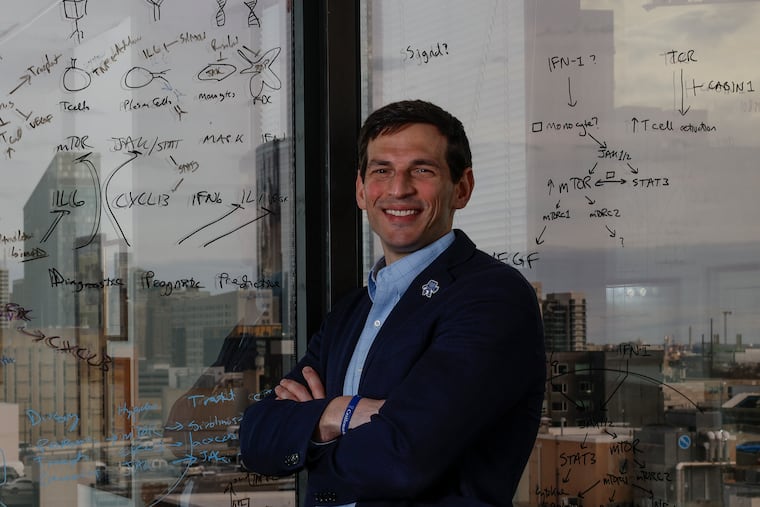This UPenn doctor’s experience with a rare disease motivated him to use AI to find new treatments for others
Every Cure, cofounded by Penn's David Fajgenbaum, received a three-year $48 million federal contract to develop an AI tool for rare diseases.

Penn immunologist David Fajgenbaum has received $48 million from the White House’s newest health agency for his nonprofit organization to find breakthrough treatments for rare diseases without the years and expense required to develop new drugs.
He’s living proof that it’s possible.
Fajgenbaum was a third-year medical student at Penn when he began experiencing flare-ups of a rare lymph node disorder. His doctors were striking out on options to control his form of Castleman disease, a condition in which a hyperactive immune system begins attacking and shutting down organs. He was so weak during one hospitalization that he called for his last rites.
He’s alive 10 years later because he decided to look for answers himself, storing vials of his blood in a campus lab fridge and testing them for abnormalities. By chance, Fajgenbaum had learned in class about a drug given to organ transplant recipients that suppresses a protein that he found was off the charts in his blood tests.
His doctors eventually agreed to try it, and Fajgenbaum recovered.
Now he wants to harness emerging AI technology to help more patients with rare diseases find potential treatments through already available drugs. The nonprofit he cofounded, Every Cure, last week was named among the first recipients of federal funding through a new effort designed to elevate treatment ideas so innovative that private industry isn’t taking the investment risk needed to realize their potential.
Through a $48 million federal contract, the Philadelphia-based group will develop an artificial intelligence program that can systematically scan tens of thousands of diseases and already approved drugs to find potential matches.
The approach would automate and expedite a process that is currently left to case-by-case serendipity, when a medical team attempts to find a new treatment for a patient’s rare disease.
“I’m alive because of a drug that wasn’t made for my disease,” Fajgenbaum said. “How many more cures are just sitting on a pharmacy shelf that we don’t even know are out there?”
AI for rare disease treatment
Fajgenbaum founded Every Cure in 2022 with his former medical school roommate, Grant W. Mitchell, and research specialist Tracey Sikora.
The new, three-year contract is a significant financial jolt from the Advanced Research Projects Agency for Health (ARPA-H), created within the National Institutes of Health in 2022 with the goal of expediting breakthrough medical treatments for cancer, Alzheimer’s, and other diseases.
Every Cure’s AI program uses algorithms to scan some 70 publicly available drug and disease databases to find commonalities. The program gives any matches a “predictive efficacy score” — a way of rating their potential to be repurposed to treat other diseases.
Matches with the highest scores represent medications with the greatest potential for addressing a disease they were not originally intended to treat.
Every Cure will recommend clinical trials to test new uses for the most promising matches.
The contract will allow Every Cure to expand its capacity to search for treatments. It plans to connect to more public databases and potentially partner with private organizations that manage drug and disease databases the nonprofit has not yet been able to access.
The money will help the nonprofit make its algorithms more precise and detailed, to better identify potential links between diseases and drugs.
Every Cure also wants to expand support for clinical trials as part of the contract. The group wants to ensure clinical trial participants are racially and geographically diverse, Sikora said.
A ‘system of serendipity’
The approach is a dramatic departure from the “system of serendipity” patients with rare diseases currently rely on, said Mitchell, the nonprofit’s CEO.
“There isn’t really any existing process,” he said.
Patients with rare diseases may wait months or years for doctors to find an already available drug that could help their condition — if they ever do. Many rely on the chance that their doctor at some point reads a relevant study or happens to know another specialist who treated a patient with a similar condition.
Fajgenbaum was lucky, he said, that the medication he needed happened to be one he’d learned about in medical school.
“I didn’t have 10 years and millions of dollars to make a new drug,” he said. “If I had any chance to survive, I had to find something that was already there.”
Fajgenbaum’s blood tests showed extremely high levels of mTOR, a protein that stimulates the immune system. He recalled learning about mTOR and a drug called sirolimus that suppresses it in a medical school class. Sirolimus is given to kidney transplant patients to prevent the immune system from rejecting the new organ.
His doctors were hesitant because they didn’t know whether the drug had ever been used to treat Castleman disease, but with no other options, ultimately agreed, Fajgenbaum said.
He now works for Penn as an immunologist and associate professor. In January, he marked 10 years in remission.